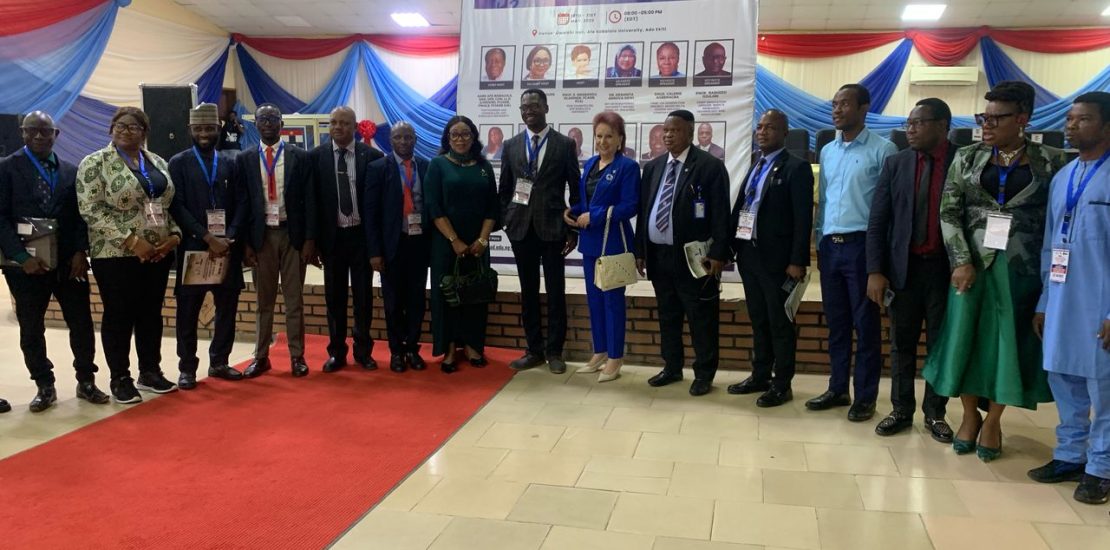- May 21, 2025
- Posted by: itmanager
- Category: Innovation, Latest News, research, University

Afe Babalola University, Ado-Ekiti (ABUAD), hosted energy experts, policymakers, academic scholars, and industry leaders at the 2nd International Conference on Clean Energy in Africa (ICCEA 2025), held from May 20 to 21, 2025. Themed “Green Energy: An Alternative Energy Source for a Sustainable Future,” the high-level conference underscored Africa’s urgent need for sustainable energy transitions amid growing environmental challenges.
Organized by ABUAD’s Hydrogen Research Institute (HRI), the event provided a robust platform for intellectual discourse, policy formulation, and technological collaboration aimed at addressing the continent’s energy demands without compromising environmental integrity.
In her opening remarks, the Vice Chancellor of ABUAD, Professor E. Smaranda Olarinde, FCArb, FCAI, described the conference as “remarkably timely,” calling for united efforts in tackling the multifaceted challenge of climate change.
“Today, we are privileged to host brilliant minds in academia, industry, policy-making, and research—a distinguished assembly that underscores our collective commitment to advancing green energy solutions across Africa and beyond.
At Afe Babalola University, we remain unwavering in our mission to foster cutting-edge research, facilitate impactful dialogues, and produce the next generation of leaders equipped to tackle one of the most pressing challenges of our time: the impact of climate change” she said.
Welcoming participants, the Director of the Hydrogen Research Institute, Engr. (Prof.) Afolalu Adeniran, emphasized that ICCEA 2025 is not merely a continuation of past efforts but a defining moment in Africa’s quest for an energy-secured and environmentally responsible future.
He lauded the participation of key stakeholders, including representatives from the Nigerian National Petroleum Company Limited (NNPCL), Nigerian Institute of Transport Technology (NITT), and Tekinologi, noting that their involvement highlighted the vital role of cross-sector collaboration in accelerating the clean energy transition.
“This platform is designed to challenge the status quo and rewrite the narrative around Africa’s dependence on fossil fuels,” Prof. Afolalu remarked.
In his presentation, one of the Keynote Speakers, Professor Ademola Abdulkareem, a renowned scholar of Electrical & Electronics Engineering from Covenant University, Ota championed the integration of Artificial Intelligence (AI) into green energy solutions. He further stressed its potential to deliver cost-effective, carbon-free, and reliable energy alternatives.
“AI is no longer futuristic; it is a current tool of transformation. When fused with energy systems, it promises to revolutionize how we generate, distribute, and consume power,” Prof. Abdulkareem noted.
Other notable speakers included Engr. Valerie Agberagba, General Manager of Generation Projects at the Niger Delta Power Holding Company (NDPHC), who joined virtually. She appealed for greater intentionality in harnessing and distributing energy resources in a manner that protects the ecosystem and improves lives, especially within African communities.
The conference continued with multiple syndicate sessions featuring paper presentations and panel discussions spanning innovations in hydrogen energy, clean mobility, renewable integration, and policy design for sustainable energy future.
Also, present at the conference were ABUAD’s Principal Officers, including the Deputy Vice Chancellor (Academic), Prof. Christopher Aina; Deputy Vice Chancellor (Administration), Prof. Olasupo Ijabadeniyi; Registrar, Lady Christy Oluborode; and the Bursar, Pastor Joseph Modupe Babalola. Heads of colleges, faculty members, and students also participated actively, reaffirming ABUAD’s position as a hub for transformative research and innovation. With ICCEA 2025, ABUAD has once again, solidified its leadership in pioneering clean energy discourse in Africa, setting the tone for a future where sustainability, innovation, and inclusive growth converge.

